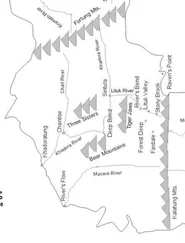The Parent calls a doctor. It opens your blindfolded eyes. This organization spreads deep enough to draw upon middle-class professionals. Sacred Conflict can rouse doctors in the night, bring them, blindfolded, to attend to their American captives, hidden under the nose of this ruptured city. The doctor spies in your mouth, up your nose, through your ear, every movement a blinding agony. Much Arabic scolding goes out in all directions. But he leaves no treatment, no medication, nothing to deaden the anguish.
Cling to nothing, you tell yourself. And that is what you cling to.
Ali disappears for a few weeks, bundled off to some Siberia in the Anti-Lebanon mountains, on the other side of the Bekaa. A change comes over your remaining guards, a horrified respect, the best measure of how gruesome the Technicolor highlights of your new face must be. They serve as your ghostly shaving mirror, these men whose cause must now look upon its own lustrous effect.
"What you want?" Walter asks. "You want something?"
You suppress the urge to ask for a quick trip to the 7-Eleven. "I want forty minutes." You try to make the terms sound self-evident, agreed upon in advance. You'll stop the foolishness. In exchange, they must take you off the chain for forty minutes a day. Forty minutes. Surely they're clever enough to keep an atrophied, blindfolded, unarmed, shoeless, prison-garbed American locked up deep in the rat' s nest of a hostile city secure for forty minutes a day?
They counter with a face-saving twenty. You shake on thirty minutes, an inconceivable figure. A treasure beyond the most bankrupt nation's debt. More than you bargained for in your maddest, most
unguarded plans.
Half an hour's freedom saves you. It expands your known world, the overnight appearance of an American continent. You pace about, astonished. From the once-mythical far side of this cube, you look back across the ocean of air. Seeing your corner like this, from a distance— your mattress, radiator, chain; the grubby country that swallowed you entire — it looks bounded, known, livable.
Thirty minutes off the chain each day. Whole new universes open at your feet. As your head heals, your exploration picks up to a trot. The cell becomes an Olympic track, a loop of imaginary cinders that you circle around and around, training, whooping in your souped-up, pounding heart at this chance to move.
You calculate the coiled-up equivalent of a mile. You jog one. Then
one-and-a-half. Then two.
You run for distance. Then for shorter sprints. Each footfall throbs in protest across your split face. But freedom makes the pain easy to run through. In fact, running is an analgesic, amphetamine, and tranquillizer by turns. You run through the hunger of this very exertion, the calorie deficit produced by these rationed, oval ecstasies.
Sometimes they unlock you in the mornings. Sometimes freedom fails to come until much later, the thrill of release stoked by a whole day of waiting. Some days they cheat you, curtailing the exercise after ten minutes. You have no proof, nor any court of appeals. But on other days they forget you, and you run until you drop. There is a drama to this variance, an unendurable tension to not knowing, every day waiting to write its script until the moment it's read aloud.
These runs are your slim exhilaration, their joy sharpened to a point by those annihilating days when something goes wrong and they fail to unchain you at all. On those days, you fall into the pit, a despair whose bottom you cannot feel. Your only weapon is to say nothing the next day, when the next day finally arrives. Give no hint of the power the enemy holds over your every feeling.
But for all the spikes on the graph, the unchecked swings between gloom and elation, your mind admits only one baseline. No mood, no insight, no exercise is large enough to fill the crushing size of a day. Hostage has but one place to return to, one owner, one prevailing emotion. All it knows is a thinly delineated, horizon-wide boredom.
Where the body is chained, the brain travels. In captivity, every inference is the freest flight. Nothing stops your associations or keeps them accountable. Your thoughts run through maniacal stunts, like radio-controlled drones at an air show. They blast through the countless embassies that offer limited asylum. Unchecked, your mind's maneuvers twist back on themselves in all directions, a nest of a million twigs that knits its own fixed prison in the static air.
You pass Gwen's birthday, the only other holiday capable of cutting through the morass of agitation and gloom. You wonder if it counts, your not sending her a card and all. Not quite the statement of indifference you'd planned — the long, pointed, unambiguous silence you had all mapped out as the answer to that last phone assault. Gwen's thirty-first: perhaps she finds it even more traumatic than her thirtieth. Once they were your allies, each extra year that thickened her. Accumulated age would remind her of the alternatives to a lasting truce. Once, you thought that all you needed was to sit back and let the years click off, until she chose you at last over permanent solitude.
By now, you're as good as dead to her. She's tucking into the birthday cake with someone simpler, someone less demanding. One of those men she always found under a rock with such surprise, so quickly, each time she fled your suffocation, so soon after deciding again that intimacy was beyond her. Some lost guy she smiled at, half a second too long, in the weight room at the gym.
You try to visualize the festivities, but can't. Can't imagine a cake, can't resolve a birthday present, make out a restaurant, or read the label on a bottle of wine. Can't imagine Gwen smiling or making a wish. If she's read about you, if the letter that Sacred Conflict dictated has made it into the American papers, then surely you must cross her mind as she blows out the candles, if only in some involuntary, reflex jaywalk. God keep you from her thoughts and let her save herself.
Winter slinks deep into Lebanon. The radiator does nothing, and the room temperature plummets. A damp cold: "dank" is the word that crawls up from the cellar of forgotten fiction. Moisture forms on the floor of the cell each night, drawn up through the capillaries in the mattress fiber to bathe you. Peat bog seeps through the cheap cotton clothes they give you. Your one thin blanket serves only to wrap your
skin in moist acrylic.
Nothing dries out by day. You strip and wring your clothes out each morning during the bathroom ritual. "Heat," you beg Walter, searching for something to bargain with.
"I ask Chef," he says. "No problem. Bukrah." Needless to say, tomorrow never comes and heat is nowhere. Outside — no consolation — must be colder and wetter. A colony of roaches moves in to share the shelter. Not your discreet, retiring, bourgeois North American species: monster Middle Eastern militia-forming creatures two inches and longer. They wake you from dreams where feathery hands incessantly strip-search you. There's no keeping them out of the mattress, off your prostrate body. Fearing disease, you launch a border war. You pinch one's head off and leave the decapitated carcass along their major thoroughfare, a lesson to the rest. But they're slow learners, one and all. In fact, the corpse draws ants.
You swat, smash, and sweep, first strategically, then more indiscriminately. But the cause starts to cost more than it repays. The great inter-species territorial war trickles out in an exhausted armistice, with victory going, as ever, to the bugs.
In the barren expanses stretching out in front of you, surely you have time to teach even the insect brain a trick or two. Prison narratives march through your mind, a pass in review, tales of all the desperate symbiotic relations struck up between inmates and other species. As far as you can remember reading, no one has ever laid claim to this virgin territory. It's yours for the taking: the Cockroach Man of Beirut.
Читать дальше












